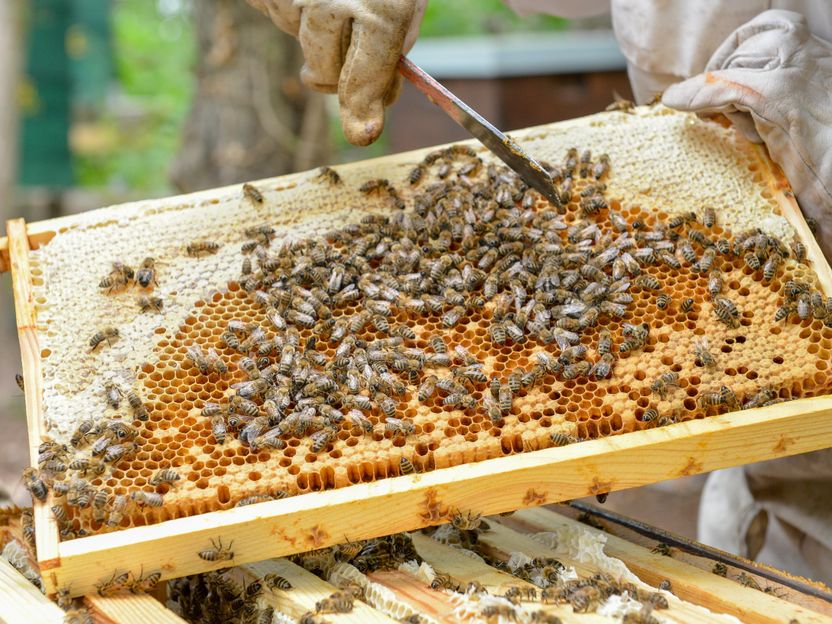New virus variant threatens bee health worldwide
A dangerous variant of the cripple wing virus is on the rise worldwide. The virus infects honey bees and causes their wings to atrophy and the animals to die. The new variant, which has already replaced the original strain of the virus in Europe, is spreading to other regions of the world and causing entire colonies to collapse. This is shown in a study by an international research team led by Martin Luther University Halle-Wittenberg (MLU), which analyzed data on the spread of the virus variants from the past 20 years. The work appeared in the "International Journal for Parasitology: Parasites and Wildlife." Friday, May 20, is World Bee Day.

A honeycomb from a beehive
Uni Halle / Markus Scholz
Deformed wing virus (DVW) is transmitted via the varroa mite. "However, the mites not only transmit viruses, but also eat the pupae of the bees," says bee researcher Prof. Dr. Robert Paxton of MLU. He has been researching the spread of various pathogens in honey and wild bees for many years. "Cripple wing virus is definitely the biggest threat to honey bees," Paxton continues. The original strain of the virus ("DVW-A") was discovered in Japan in the early 1980s, and the new variant "DVW-B" was first described in the Netherlands in 2001. "Our laboratory studies have shown that the new variant kills bees faster and that it is transmitted better at the same time," says Paxton.
The team led by the zoologist therefore wanted to find out how widespread the new variant already is in nature. To do this, the researchers evaluated around 3,000 data sets of honey bees, ground bumblebees and varroa mites from the U.S. biodatabase NCBI, which contain references to the genetic material of the viruses. They also researched the first scientifically documented mentions of the "DVW-B" variant for numerous countries. "Our analyses show that the new variant has already become established in Europe and that it should only be a matter of time before the variant is dominant throughout the world," Paxton said. In the 2000s, the new variant was found primarily in Europe and Africa. It was discovered in North and South America in the early 2010s, and in Asia in 2015. With the exception of Australia, the virus variant has been detected on all continents. According to the researchers, this could be due to the fact that the varroa mite has not yet been able to settle widely in Australia.
Evidence of the virus could also be found in samples from ground bumblebees. "Whether the virus will have similarly devastating consequences in bumblebees and other wild bees cannot be said with certainty. So far, commercially kept bumblebee colonies with the virus at least are not dying at a significantly higher rate," Paxton said. There are various means and methods to protect bees from the varroa mite and the virus, he said: "The most important thing is to pay attention to hygiene in the hive. Here, simple measures can help protect not only your own colony from varroa, but also wild bees that no one else cares about," Paxton concludes.
As pollinators of many wild and cultivated plants, honey bees are indispensable for fruit yield and for maintaining biodiversity. The loss of bee colonies is therefore observed with concern by experts worldwide. To commemorate the importance of bees, the United Nations General Assembly has proclaimed May 20 as "World Bee Day".
The study was funded by the German Research Foundation (DFG) and the Iranian Ministry of Science and Technology.
Note: This article has been translated using a computer system without human intervention. LUMITOS offers these automatic translations to present a wider range of current news. Since this article has been translated with automatic translation, it is possible that it contains errors in vocabulary, syntax or grammar. The original article in German can be found here.
Most read news
Other news from the department science

Get the food & beverage industry in your inbox
By submitting this form you agree that LUMITOS AG will send you the newsletter(s) selected above by email. Your data will not be passed on to third parties. Your data will be stored and processed in accordance with our data protection regulations. LUMITOS may contact you by email for the purpose of advertising or market and opinion surveys. You can revoke your consent at any time without giving reasons to LUMITOS AG, Ernst-Augustin-Str. 2, 12489 Berlin, Germany or by e-mail at revoke@lumitos.com with effect for the future. In addition, each email contains a link to unsubscribe from the corresponding newsletter.

























































